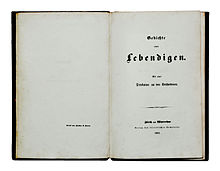Lullaby (Herwegh)

Lullaby is a poem by Georg Herwegh , which Georg Herwegh published anonymously in 1841 in Poems of a Living in Switzerland due to political persecution and censorship in Prussia .
It is preceded by a quote from Johann Wolfgang von Goethe's sleep, what more could you want? Herwegh always only calls the "poet prince" Göthe , which he also includes as a refrain in the poem. Here parodied the lullaby equally traditional forms of sleep or lullaby as the political conditions in Germany at the time of pre-March and from Goethe's Night Song .
text
Germany - on soft puddles
Don't
worry your head in the earthly turmoil!
Sleep what more do you want
Let all freedom be
stolen from you, do not defend yourself,
you keep your Christian faith;
Sleep what more do you want
And whether everything is forbidden to you,
But don't grieve too much,
you have Schiller and Göthe:
Sleep, what more do you want?
Your king protects the camels
and makes them retired,
three hundred thalers the soul:
Sleep, what more do you want?
There are three hundred leaves fencing in the
shade, an army of Sparter;
And every day you find out the weather:
Sleep, what more do you want?
No child walks
around without panties On the Rhine, the free one:
My Germany, my Sleeping Beauty,
sleep, what more do you want?
background
Herwegh parodies the lullaby by interplaying with the cultural and political grievances, which is only felt by supposed achievements, such as the writings of the German classics by Goethe and Friedrich Schiller or an at least quantitatively numerous press landscape, the rhetorical question sleep, what more do you want represents. The Christian-motivated divine right , the early retirement of liberal ministers by the Prussian King Friedrich Wilhelm IV. Is also discussed relatively openly in the poem. The press, however, is a caricature if it is three hundred sheets thick, like the army of the Spartans under King Leonidas I , but ultimately limits its reporting to banalities and the weather. In general, Herwegh referred several times in both volumes of poetry to the battle of Thermopylae , which for him takes on the meaning of revolutionary sacrificial death.
The answer to his question is secretly that Germany should want constitutional political freedoms instead of having to wait like Sleeping Beauty for the prince. The publication of the poems made Herwegh known for a short time across Europe.
reception
“With all of his other songs, Herwegh did not achieve the success or the poetic value of the“ Poems of a Living Man ”. In them he had been able to combine, with Platen's strictness of form, the advantages of Béranger's popular, clear and sharp political chansons, and had achieved an achievement as a poet independent of party color ”.
expenditure
- Georg Herwegh : Poems of a living person . 2 Theil, Zurich and Winterthur 1843, p. 88f.
- Hermann Tardel (ed.): Herwegh's works in three parts . Vol. 1, German publishing house Bong & Co., Berlin et al. 1909.
- Georgh Herwegh: poems and prose . Selected by Peter Hasubek, Reclam 1975.
literature
- Ernst Baldinger: Georg Herwegh. The world of thoughts of the “poems of a living person” . Bern 1917 (= language and poetry. Research on linguistics and literary studies, edited by Harry Maync and S. Singer, no. 19).
- Wolfgang Büttner: Georg Herwegh. Poet and revolutionary . In: Men of the Revolution of 1848 . Edited by Helmut Bleiber et al., Vol. 2, Berlin 1987, pp. 151-182.
- Ingo Fellrath: In search of a new poetics: Georg Herwegh's turn to social poetry . In: Philosophy, literature and politics before the revolutions of 1848. On the development of democratic movements in Europe . Edited by Lars Lambrecht , Frankfurt a. M. 1996, pp. 455-462.
Web links
- Text of the lullaby on zeno.org (based on: Hermann Tardel (Hrsg.): Herwegh's works in three parts . Vol. 1, German publishing house Bong & Co., Berlin et al. 1909.)
Individual evidence
- ↑ Poems of a living person . 1 Theil, Zurich and Winterthur 1841, p. 88f.
- ^ Text based on Goethe's works. Last edition at zeno.org http://www.zeno.org/nid/20004839609
- ^ After: German poetry from the baroque to the present . dtv, Munich 1980, p. 186.
- ↑ Anuschka Albertz: Exemplary heroism, the reception history of the battle of Thermopylae from antiquity to the present . Oldenbourg, Munich 2004, p. 213.
- ↑ Archived copy ( memento of the original dated August 14, 2011 in the Internet Archive ) Info: The archive link was inserted automatically and has not yet been checked. Please check the original and archive link according to the instructions and then remove this notice.
- ↑ Werner Feudel: Herwegh's "Gedichte eines Lebendigen" and the poet's trip to Germany as reflected in the contemporary press . In: Heinrich Heine and the contemporaries. Historical and literary findings . Berlin / Weimar 1979, pp. 37-64.
- ↑ Fanny Lewald : Georg Herwegh, the author of the poems of a living person . In Europe. Chronicle of the Educated World, 1841, Vol. 4, pp. 163-169.
- ^ Friedrich Vogt / Max Koch: History of German literature from the oldest times to the present . 3rd vol., 4th edition, Leipzig 1926, p. 148.
